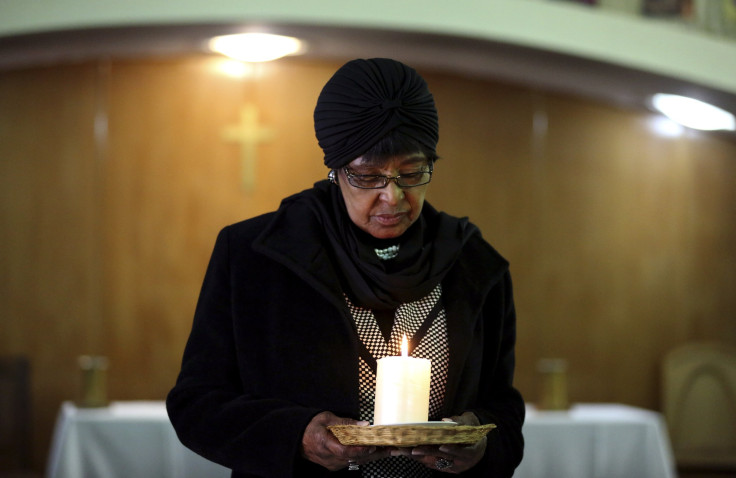Winnie Madikizela-Mandela: Nelson's Former Wife & Controversial 'Mother Of The Nation'

Nelson Mandela's death on Thursday at the age of 95 marked the end of a life of bravery, compassion and love, but his former wife, Winnie Madikizela-Mandela, lives on in his absence.
The 77-year-old, known as "Mother of the Nation," is a towering -- yet controversial -- public figure in her own right, as she was married to Nelson Mandela throughout the entirety of his 27-year imprisonment, and she was imprisoned for 18-months in solitary confinement in a South African prison by authorities who wanted to suppress her political activism. She was Nelson Mandela's second wife; Mandela was married to Evelyn Wase in 1944, and in 1998 he married Graca Machel, the widow of Mozambican President Samora Machel. Mandela remained wed to Graca Machel until he died.
Like her husband, Winnie Mandela -- the shortened moniker by which many people refer to her by to this day -- was a leading voice in the anti-apartheid movement alongside her husband, who served a five-year term as president of South Africa but was best-known for his brave, passionate and inspirational efforts to end the violent apartheid regime in his home country and bring its people together in peace. The two leaders were married in 1958 and had two daughters, Zenani and Zindzi, and they worked together to change the nature of the South African state and its societal and political ills.
When Nelson Mandela was arrested in 1964, his wife continued to engage in political activities throughout his imprisonment. Madikizela-Mandela, who was born in the small village of Bizana, South Africa, on Sept. 26, 1936, worked alongside Nelson Mandela after his release from prison in 1990, serving in the South African Parliament and as president of the African National Congress Women's League.
But she was doomed to controversy, which led to the couple's divorce in 1996. In 1985 her home was bombed, steeling her determination and resolve, but she was also connected to violence multiple times. She was quoted as endorsing "necklacing," the practice of burning black South Africans who worked with the apartheid regime, and her bodyguards, dubbed the Mandela United Football Club, were known for being violent, even going so far as to kidnap a 14-year-old boy named Stompie Moeketsi and killing him in 1989, a crime for which she was convicted of kidnapping and assault, according to a profile of her by Biography. She was also convicted in 2003 of economic fraud perpetrated while serving her final term as a Parliament member, but the conviction was overturned.
Despite the controversy over Madikazela-Mandela's radicalism and her violent rhetoric, she remained one of the most important people in Nelson Mandela's long life, and she was often by her husband's side in his Johannesburg home during his final days and acted as a liaison to the press at times, passing on information about the beloved leader's condition and shooting down incorrect rumors.
"I have heard this nonsense that he is on life support -- he is not," she told South Africa's Sunday Independent newspaper last month, according to the Associated Press. When a reporter asked if he was peaceful, she said, "Very. When he is very relaxed, he is fine."
Her remarks to the Sunday Independent came just days before "Mandela: Long Walk To Freedom," a film adaptation of Nelson Mandela's autobiography starring actor Idris Elba in the lead role, hit theaters. Madikizela-Mandela told the newspaper she would have loved for her husband to be healthy enough to watch the biopic, and to read her prison diaries, which were published under the title "491 Days: Prisoner 1323/69" earlier this year.
"Of course, I wish he could read the book, but I really wish he could see the film," said Madikizela, who was also portrayed by Jennifer Hudson in the 2011 film "Winnie."
But on Thursday, her hopes for such a miracle drew to a close, as did the life of one of the most inspiring and influential people of the past century.
© Copyright IBTimes 2024. All rights reserved.




















